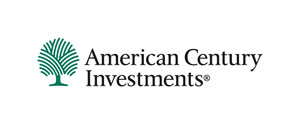KANSAS CITY, Mo., Oct. 13, 2022 /PRNewswire/ -- Today, $195.8 billion* asset manager American Century Investments® launched its newest Exchange Traded Fund (ETF). Now listed on NASDAQ, American Century Short Duration Strategic Income (SDSI) is the latest addition to the firm's active ETF lineup.
"SDSI expands our existing Short Duration Strategic Income capabilities to an actively managed ETF," said Ed Rosenberg, American Century's head of ETFs. "The Short Duration Strategic Income ETF seeks to complement an investor's core bond holdings with high current income, broad diversification and the potential to mitigate the impact of rising rates."
SDSI seeks income and as a secondary objective, long-term capital appreciation. The strategy will seek to generate attractive yield by investing across multiple fixed income market segments which maintain a short duration focus. It invests in both investment-grade and high-yield, non-money market debt securities. These securities may include corporate bonds and notes, government securities and securities backed by mortgages or other assets. The fund is a transparent active ETF with holdings disclosed daily and an expense ratio of .32 percent.
The strategy will be managed by Jason Greenblath, Charles Tan, Jeffrey Houston, CFA and Peter Van Gelderen.
"SDSI complements the existing MUSI ETF, launched in June 2021, which leverages the same philosophy, process and portfolio management team but targets a short duration," said Greenblath.
American Century Investments is a leading global asset manager focused on delivering investment results and building long-term client relationships while supporting breakthrough medical research. Founded in 1958, American Century Investments' 1,400 employees serve financial professionals, institutions, corporations and individual investors from offices in New York; London; Frankfurt; Hong Kong; Sydney; Santa Clara, Calif.; and Kansas City, Mo. Jonathan S. Thomas is president and chief executive officer, and Victor Zhang serves as chief investment officer. Delivering investment results to clients enables American Century Investments to distribute over 40% of its dividends to the Stowers Institute for Medical Research, a 500-person, nonprofit basic biomedical research organization. The Institute owns more than 40% of American Century Investments and has received dividend payments of $1.87 billion since 2000. For more information about American Century Investments, visit www.americancentury.com.
*Assets under supervision as of 10/5/2022.
You should consider the fund's investment objectives, risks, charges and expenses carefully before you invest. The fund's prospectus or summary prospectus, which can be obtained by visiting americancentury.com, contains this and other information about the fund, and should be read carefully before investing.
Exchange Traded Funds (ETFs) are bought and sold through exchange trading at market price (not NAV) and are not individually redeemed from the fund. Shares may trade at a premium or discount to their NAV in the secondary market. Brokerage commissions will reduce returns.
Investment return and principal value of security investments will fluctuate. The value at the time of redemption may be more or less than the original cost. Past performance is no guarantee of future results.
These funds are actively managed Exchange Traded Fund (ETF) that do not seek to replicate the performance of a specified index. To determine whether to buy or sell a security, the portfolio managers consider, among other things, various fund requirements and standards, along with economic conditions, alternative investments, interest rates and various credit metrics. If the portfolio manager considerations are inaccurate or misapplied, the fund's performance may suffer.
Duration, which is an indication of the relative sensitivity of a security's market value to changes in interest rates, is based upon the aggregate of the present value of all principal and interest payments to be received, discounted at the current market rate of interest and expressed in years. The longer the weighted average duration of the fund's portfolio, the more sensitive its market value is to interest rate fluctuations. Duration is different from maturity in that it attempts to measure the interest rate sensitivity of a security, as opposed to its expected final maturity.
Generally, as interest rates rise, the value of the securities held in the fund will decline. The opposite is true when interest rates decline.
The lower rated securities in which the fund invests are subject to greater credit risk, default risk and liquidity risk.
Derivatives may be more sensitive to changes in market conditions and may amplify risks.
Diversification does not assure a profit, nor does it protect against loss of principal.
Exchange Traded Funds (ETFs): Foreside Fund Services, LLC – Distributor, not affiliated with American Century Investment Services, Inc.
©2022 American Century Proprietary Holdings, Inc. All rights reserved.
Contact: Laura Kouri
(816) 340-4710
SOURCE American Century Investments

WANT YOUR COMPANY'S NEWS FEATURED ON PRNEWSWIRE.COM?
Newsrooms &
Influencers
Digital Media
Outlets
Journalists
Opted In





Share this article